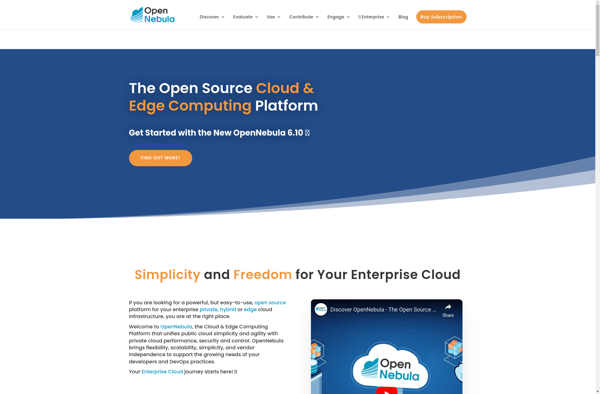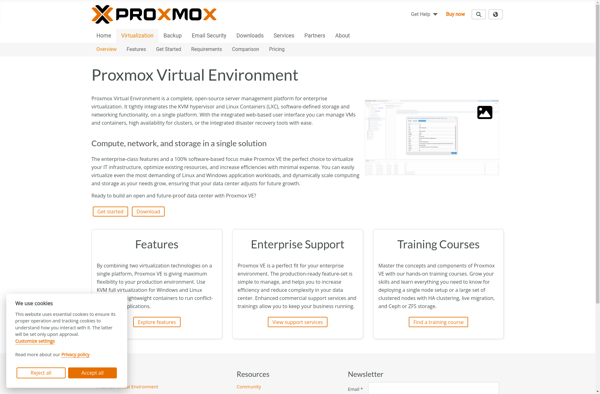OpenNebula
OpenNebula is an open-source cloud computing platform that provides capabilities for managing virtualized data centers and enterprise clouds. It supports features like virtual machine provisioning, network management, resource monitoring, and multi-tenancy.

OpenNebula: Open-Source Cloud Computing Platform
OpenNebula is an open-source cloud computing platform that provides capabilities for managing virtualized data centers and enterprise clouds, supporting features like virtual machine provisioning, network management, resource monitoring, and multi-tenancy.
What is OpenNebula?
OpenNebula is an open-source cloud computing toolkit for managing heterogeneous distributed data center infrastructures. It provides a unified frontend to manage virtualized compute, storage, and network resources. Key capabilities include:
- Provisioning and management of virtual machines on distributed infrastructures like clusters, grids, and cloud environments
- Virtual machine image management, including upload, transfer, clone, import/export, and snapshot functions
- Virtual network management, including assignment of virtual machines to different virtual networks, addressing, bridging to physical networks, and security groups
- Monitoring and accounting of actual resource consumption at the virtual machine, user, group or cloud level, enabling showback and chargeback models
- Support for hybrid cloud environments through interfaces with public clouds like AWS, Azure and OpenStack
- Federation across multiple data centers for pooling and sharing of resources
- Multi-tenancy through user, group and role based access control mechanisms
- Command line tools, GUI and API for integration with third party management tools
Overall, OpenNebula provides a flexible platform for managing enterprise clouds and virtualized data centers with capabilities tailored for production environments.
OpenNebula Features
Features
- Virtual Machine Management
- Storage Management
- Network Management
- Access Control & Accounting
- Hybrid & Edge Cloud
- Multi-Cloud & Federation
- Automation & Orchestration
Pricing
- Open Source
Pros
Open source and free to use
Supports multiple hypervisors
Flexible and modular architecture
Good community support
Integrates with Kubernetes
Cons
Steep learning curve
Not as feature rich as proprietary solutions
Limited documentation and support options
Not ideal for large scale deployments
Official Links
Reviews & Ratings
Login to ReviewThe Best OpenNebula Alternatives
Top Network & Admin and Cloud Computing and other similar apps like OpenNebula
Here are some alternatives to OpenNebula:
Suggest an alternative ❐OpenStack
OpenStack is an open-source cloud operating system that controls large pools of compute, storage, and networking resources. It is managed through a dashboard or via the OpenStack API. OpenStack works with popular enterprise and open source technologies, making it ideal for heterogeneous infrastructure.OpenStack provides an Infrastructure-as-a-Service (IaaS) solution through a...

Proxmox Virtual Environment
Proxmox Virtual Environment (Proxmox VE) is an open-source server virtualization management solution based on QEMU/KVM virtualization and LXC containers. It allows you to manage virtual machines and containers using a web-based GUI. Key features include:Hypervisor built on Linux Kernel-based Virtual Machine (KVM) technology for virtualizationLinux Containers (LXC) for container-based virtualizationWeb-based...

MicroCloud
MicroCloud is an open-source private cloud computing platform built using proven open-source technologies. It aims to provide users with an easy way to deploy virtual machines and containers in their own private cloud infrastructure, without the cost and privacy concerns of public cloud providers.At its core, MicroCloud uses libvirt and...

CloudStack
CloudStack is an open source cloud computing software platform that is used to create, manage, and deploy infrastructure cloud services. It allows organizations to build full-featured public or private clouds, capable of elastic scaling to handle changing workloads.Some key capabilities and features of CloudStack include:Supports multiple hypervisors like KVM, VMware,...

ZeroStack
ZeroStack is an open source platform that allows developers to build, run and scale applications without having to manage servers or infrastructure. It provides a serverless architecture and completely abstracts away the underlying infrastructure.Some key features of ZeroStack include:Auto-scaling based on demandBuilt-in monitoring, logging and analyticsGlobal deployment across regionsIntegrated security...